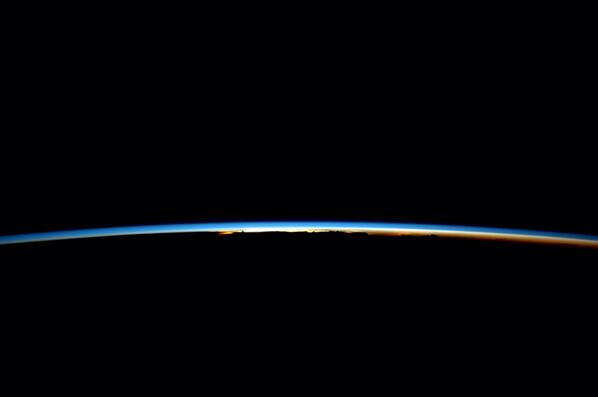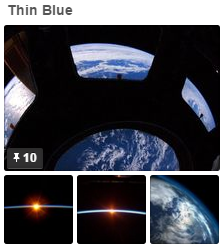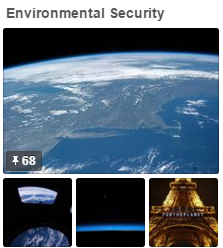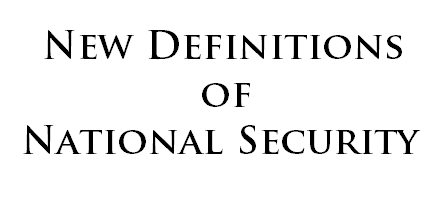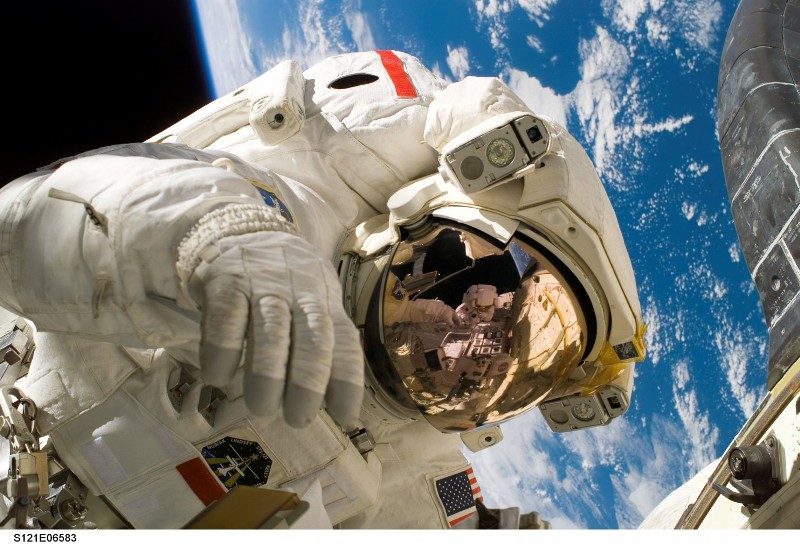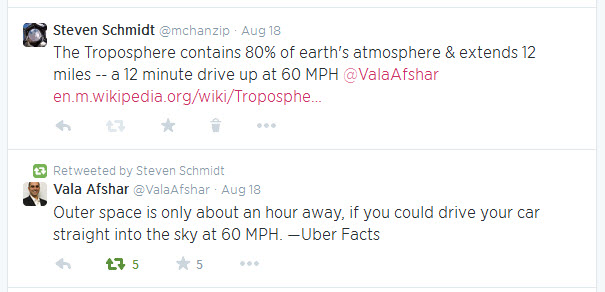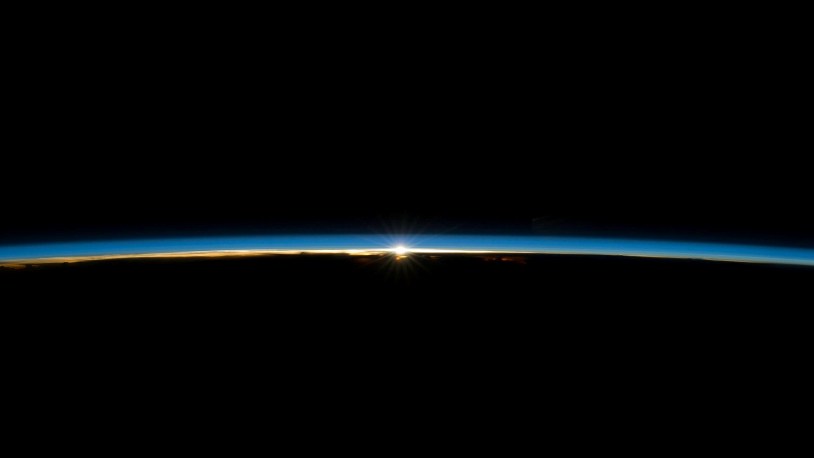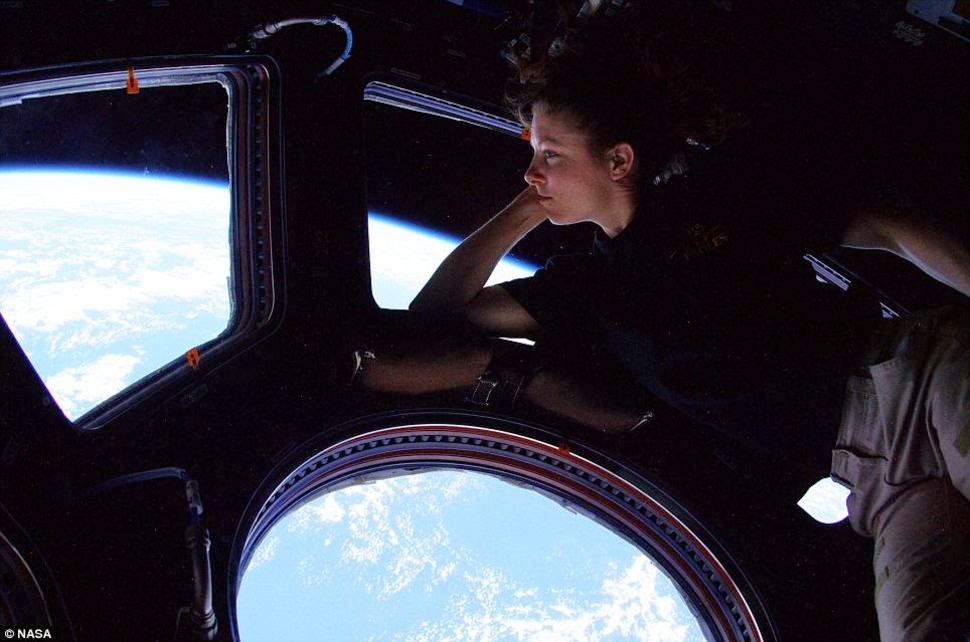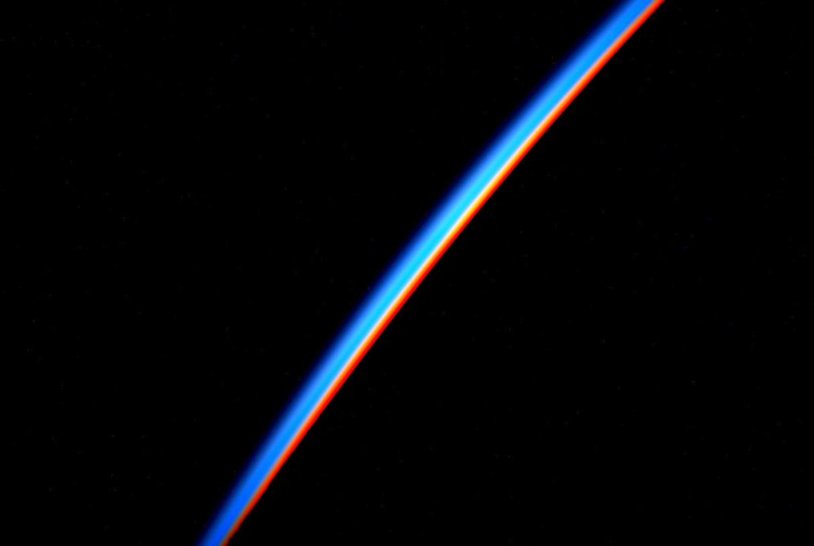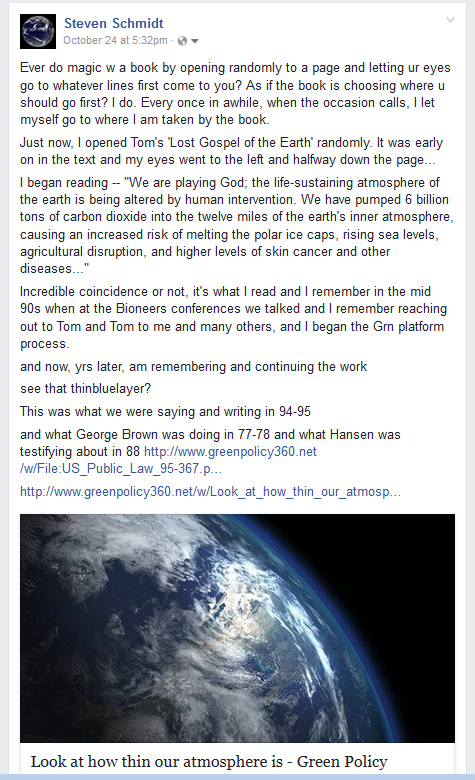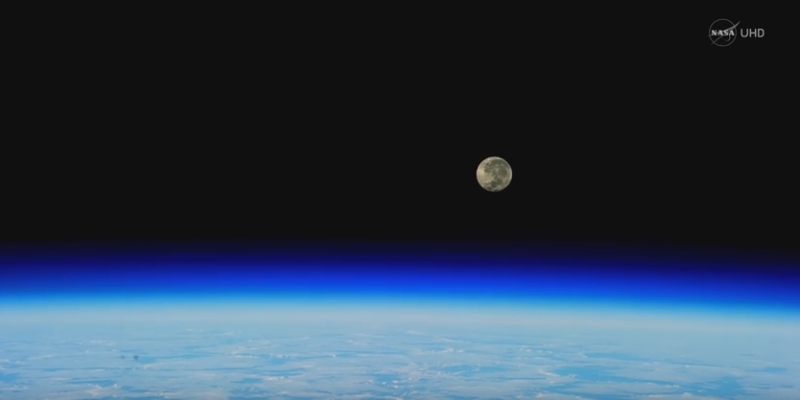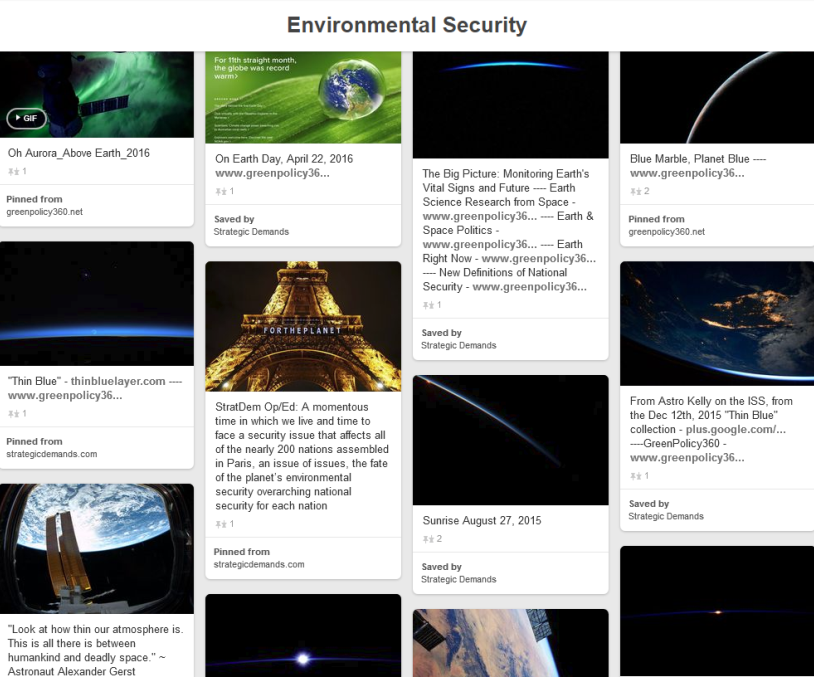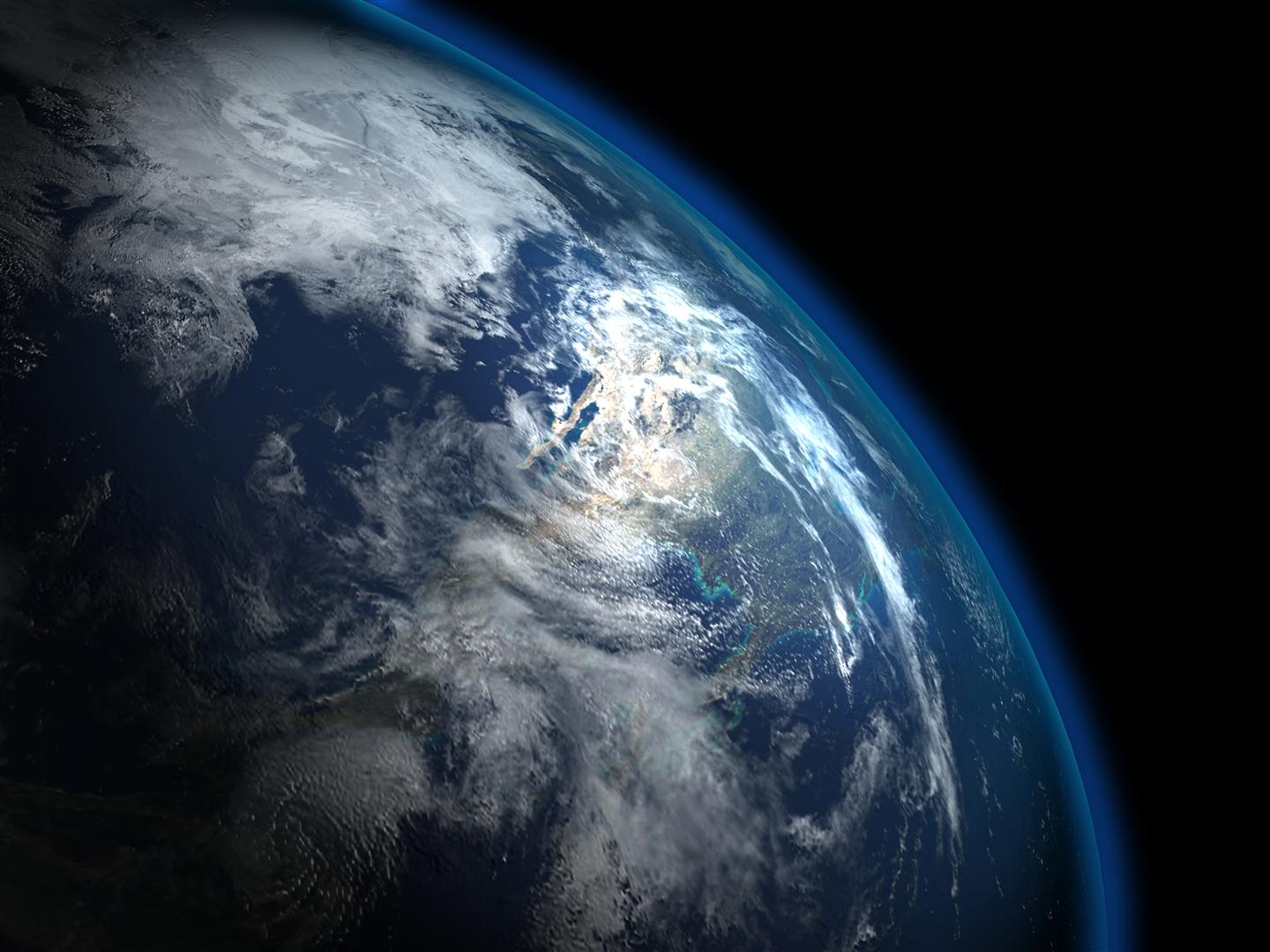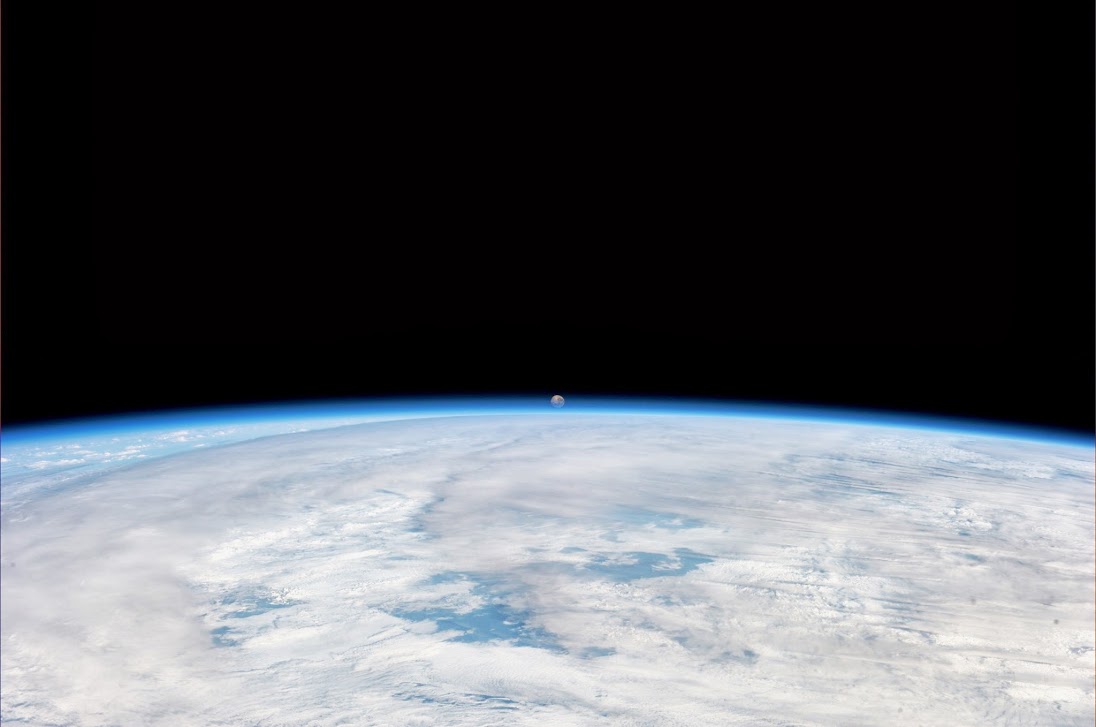Look at how thin our atmosphere is
- Dawn from Space
- fragile edge of our planet
- thin blue line
- mysterious rhythm
- our next breath
- heart struck with wonder
- mind dizzy with awe
- -- Doug Wheelock @Astro_Wheels
"Thin Blue Layer"
- "Look at how thin our atmosphere is. This is all there is between humankind and deadly space."
- ~ Astronaut Alexander Gerst
- "Look at how thin our atmosphere is. This is all there is between humankind and deadly space."
○ ○ ○ ○ ○ ○ ○ ○ ○ ○ ○ ○ ○ ○ ○ ○ ○ ○ ○ ○
Piers Sellers Passes from Earth
- Astronaut Piers Sellers, a dual British-US citizen, made a point of using his experiences as an astronaut to further planetary awareness of climate issues. As a climate scientist and for many years director of NASA's Goddard Earth Science division, he was surprised to see how thin the atmosphere was. “That really brought home to me how easily mankind can affect its own environment. The stuff we breathe, there’s not much of it. It’s a very thin atmosphere. We better pay attention.”
- "As an astronaut I spacewalked 220 miles above the Earth. Floating alongside the International Space Station, I watched hurricanes cartwheel across oceans, the Amazon snake its way to the sea through a brilliant green carpet of forest, and gigantic nighttime thunderstorms flash and flare for hundreds of miles along the Equator."
- "From this God’s-eye-view, I saw how fragile and infinitely precious the Earth is. I’m hopeful for its future."
Looking over Piers' right shoulder, in the near distance, together we can see the "Thin Blue" layer surrounding Earth, our planet home
Environmental Security & the 'Thin Blue' Layer
Strategic Demands: New Definitions of National Security and Environmental Security
- "Thin Blue" -- a Global Trust, Earth's Atmosphere
○ ○ ○ ○ ○ ○ ○ ○ ○ ○ ○ ○ ○ ○ ○ ○ ○ ○ ○ ○ ○
Driving Up There, From Down Here
"Perspective... from an Astronaut's point of view the thinness of the Earth’s life-supporting envelope is clear to see. Yet, from the surface of the Earth, looking up, it is not clear at all how far the atmosphere goes. It is not clear how this 'thin blue' layer acts to protect our planetary ecosystems, our biosphere.
"A collapse of the biosphere due to anthropogenic climate change is not an impossible scenario when seen with an overview perspective. The words of astronauts speaking of the thin layer of Earth's protective atmosphere are as if a modern Cassandra is warning without being heard or listened to by those too busy to hear..."
"Let's talk in common language then, the language of cars and these cars are being driven up into the sky, not on highways to work or play. How far is it before we reach the edge of space, the border to life as we know it down here on Earth? How can kids in schools get a lesson that simply says "the 'thin blue' atmosphere that protects life on Earth is at risk and needs to be carefully taken care of and preserved. Our planet's health is in your care..." -- SJS / Siterunner
○
Looking @ the Troposphere and Atmosphere
○
One of the earliest known experiences of space travel, a whole earth perspective shared by returning astronauts, what author Frank White has called the “Overview Effect”
○
“For the first time in my life, I saw the horizon as a curved line. It was accentuated by a thin seam of dark blue light: the atmosphere...”
- “This was not the ‘ocean’ of air I had been told it was ... I was terrified by its fragile appearance.” -- Astronaut Merbold
Astronaut Gerst: “Some things that on Earth we see in the news every day and thus almost tend to accept as a “given”, appear very different from our perspective.”
- “We do not see any borders from space. We just see a unique planet with a thin, fragile atmosphere, suspended in a vast and hostile darkness.”
- “From up here it is crystal clear that on Earth we are one humanity.”
○
"An Experiment of Epic Scale: Anthropogenic Change of Our Atmosphere"
Atmosphere of Earth - Wiki Isn't It About Time? ... We are in the first era of geo-monitoring the thin blue atmosphere, earth systems and biosphere from space ... [1] [2]
Beginning with first-ever images of our home planet, Earth, taken from the Apollo era ... [3] [4]
Now #Earth360 follows with first-generation #EarthObservations
An #EarthPOV, an "Overview" that, over time, will educate and open all to new challenges
Our generation faces new possibilities and challenges as citizens of the planet ...
- ○ ○ ○ ○ ○ ○ ○ ○ ○ ○ ○ ○ ○ ○ ○ ○ ○ ○ ○ ○ ○ ○ ○ ○ ○ ○ ○ ○ ○ ○ ○
Steven Schmidt / GP360 Siterunner: "A chemical experiment with unknown consequences is taking place above and around us. The Earth's atmosphere, a thin layer that enables and protects life, is being impacted by potentially deadly human-produced emissions, even as a first generation of data and science is being produced with atmospheric observations from space. We are beginning to realize the extent of an existential experiment humanity is conducting in the atmosphere of the planet. The Anthropocene era is a gathering storm that is changing 'nature' and our responsibility to future generations is profound."
○
Elon Musk: "The greater the change to the chemical composition of the physical, chemical makeup of the oceans and atmosphere [due to increased carbon emissions], the greater the long-term effect will be... [W]hy would you run this crazy experiment to see how bad it'll be? We know it's at least some bad, and the overwhelming scientific consensus is that it'll be really bad."
“Even if you put the environmental consequences of dramatically changing the chemical composition of the oceans and atmosphere aside, we will eventually run out of oil. If we don’t find a solution to burning oil for transport, and we then run out of oil, the economy will collapse and civilization will come to an end as we know it. And so if we know that we have to ultimately get off oil no matter what — we know that is an inescapable outcome, it’s simply a question of when, not if — then, why would you run this crazy experiment of changing the chemical composition of the atmosphere and oceans by adding enormous amounts of CO2 that’ve been buried since the pre-Cambrian era? That’s crazy. That is the dumbest experiment in history, by far. Can you think of a dumber experiment? I honestly cannot. What good could possibly come of it?” -- Interviewed by Neil DeGrasse Tyson’s in 'Star Talk'
○
A New Vision of Security -- Looking Up to See the Challenge of the 21st Century
The high ground, the atmosphere, atmospheric and earth science being developed by a first generation of environmental, planet scientists
The 'thin blue layer' is a common ground, a necessary, vital, existential space that must be protected for our common survival
- A paradigm, new strategies to define and act upon national security needs and challenges
- An endeavor of GreenPolicy360 and StrategicDemands in the national security space
○
- The "thin blue" layer... absorbing the sum of human-produced emissions...
- as today's generation begins to measure and calculate the cost of anthropogenic "externalities"
◊
Tags: #Atmospheric Science; #ClimatePolicy; #Environmental Security; #PlanetCitizen; #Sustainability; #Sustainable Development; #Sustainability Policies; #ThinBlueLayer
◊
- Anthropocene
- Atmosphere
- Citizen Science
- Climate Policy
- Democratization of Space
- EOS eco Operating System
- Earth Observations
- Earth Science
- EarthPOV
- Earth360
- Eco-nomics
- Environmental Full-cost Accounting
- Environmental Security
- Environmental Security, National Security
- Global Security
- Global Warming
- Green Politics
- Natural Resources
- Networking
- New Definitions of National Security
- New Space
- Overview Effect
- Planet Citizen
- Planet Scientist
- Seventh Generation Sustainability
- Strategic Demands
- ThinBlueLayer
- US Environmental Protection Agency
- Atmospheric Science
- Biogeosciences
- Climate Change
- Cryosphere
- Geophysics and Geochemistry
- Mineralogy
- Geology
- Geophysics
- Hydrology
- Ocean Science
- Planetary Science
- Space Science and Space Physics
